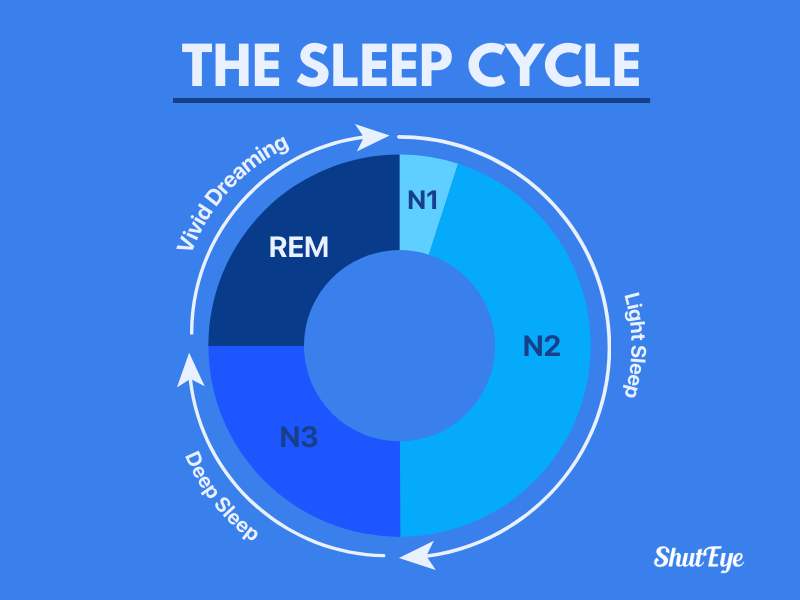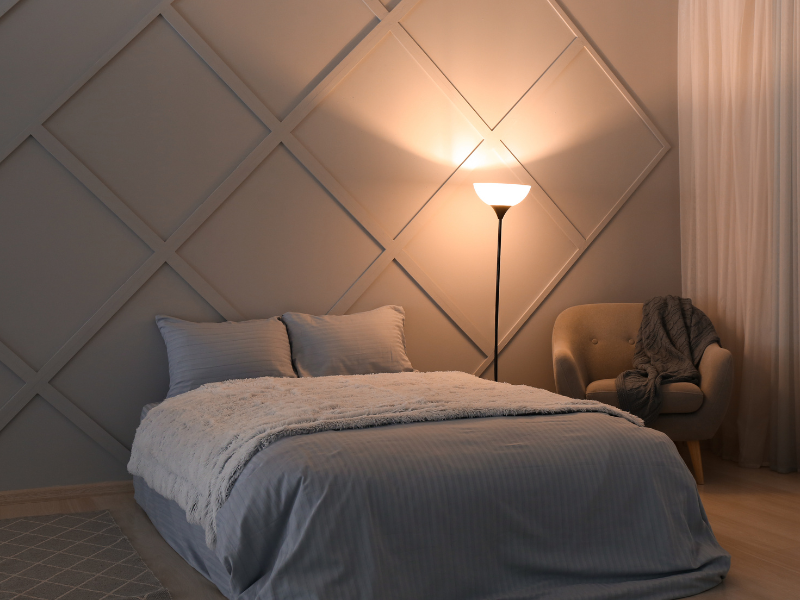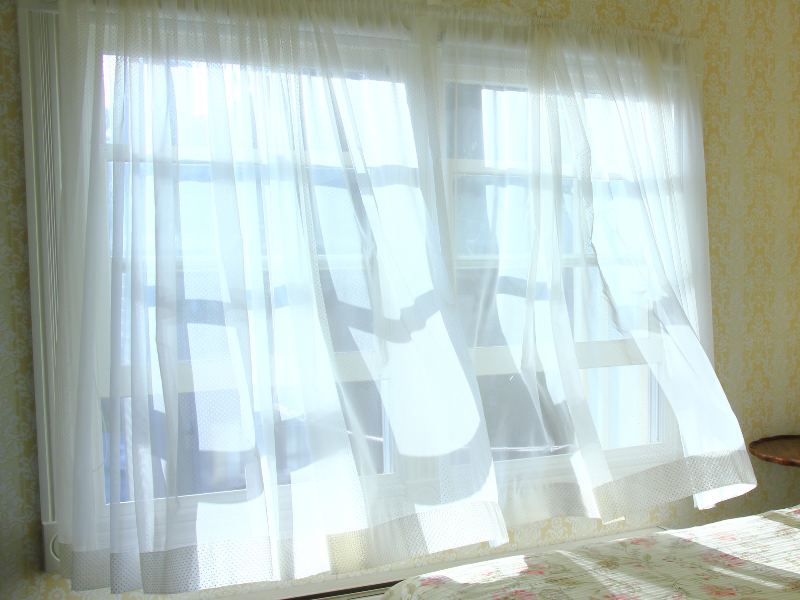


Not many people are aware but deep sleep is essential in improving our working memory and strengthening our immune system. Not getting enough deep sleep affects the way our body heals and repairs itself. It may also predispose us to higher risks of heart disease and Alzheimer’s. In this article, we will share 15 tips on how to increase deep sleep.

Our sleep cycle comprises of 4 stages of sleep— Non-Rapid Eye Movement (NREM) stages 1,2,3 and Rapid Eye Movement (REM) sleep. Deep sleep falls under NREM Stage 3, also known as slow wave sleep (SWS). This stage is typically the hardest for people to awaken from and it occurs just before REM sleep stage [1].
Deep sleep is beneficial to us for a variety of reasons. It plays an important role in helping our body to repair itself, grow tissues, build stronger muscles and bones, and strengthen our immune system [1].
Besides the physical benefits, it helps us to improve our memory and remember information learned during the day. It also decreases the susceptibility to mental health conditions such as depression [2].

On average, we need between 1.5 hours to 2 hours of deep sleep per night. Your body naturally passes through a few different sleep stages throughout the night, even if you don’t wake up. It’s normal to dip in and out of the deep sleep state 2-4 times per night and spend 15-60 minutes at that stage each time.
An adult should aim to be in the deep sleep stage for 10 to 15% of the total sleep time. Children and teenagers usually require more deep sleep compared to adults [3].
It is worth noting that the amount of deep sleep that you need is dependent on factors such as age and personal differences. As you age, the amount of deep sleep required decreases. So, the emphasis is really on getting good sleep quality each night.
See also: How Much Deep Sleep Is Needed By Age?

You’ve probably heard people in your life saying that keeping yourself physically active helps you to stay healthy. Well, this is true!
Exercising regularly has several health benefits. According to a systematic review, physical activity can help you to fall asleep faster and get a good night’s sleep. This is due to the increased production of the sleep hormone, melatonin which helps to regulate the sleep-wake cycle.
You should aim to keep yourself moving at least 2 to 3 times per week.
A healthy diet does more than just improve weight loss; it also has an impact on the quality of sleep you get. Studies have shown that a greater intake of fiber can result in more time spent in the stage of deep sleep. It shows that diet and sleep patterns are highly interconnected.
If you consume a low-fiber diet, it could cause lighter sleep and less restorative sleep [4]. To ensure that you get the restful sleep that you need, consider including more fiber in your diet.
Caffeine is a stimulant that can make it harder for you to fall and stay asleep. It also can reduce the amount of deep sleep you get. One study found that consuming caffeine seven hours before bedtime reduced the amount of sleep received by one hour.
If you need to drink caffeine to stay awake, try to do it earlier in the day (e.g. in the morning or afternoon). If you need to keep yourself up after those hours, try natural methods such as drinking water, deep breathing exercises, or meditation.
Alcohol before bed may help put you to sleep, however, it’s likely you won’t stay asleep. When you have a nightcap before bed, the alcohol gets processed by the body. The sedative effect it once had disappears and will often create a rebound effect — waking you up in the middle of the night and interrupting deep sleep.
Also, alcohol is a cause for snoring. Something that you want to avoid at night!
Stress from a busy workday or a taxing afternoon with the kids can make it difficult to shut your mind off and enjoy sleep. Creating a relaxing bedtime routine can help to calm the mind and destress.
Your bedtime routine should be anywhere from 30 to 60 minutes and the key is to keep your routine consistent. This will help your mind associate the routine with sleep and set you up for a productive next day.

The environment where you lay your head each night should be sleep-friendly. Having a comfortable sleep environment could help you to fall into deeper sleep and get quality sleep.
Some ways to create a peaceful and relaxing sleep environment would be to dim down the lights, ensure that it is quiet, and keep your bedroom at a cool temperature.
It’s also important that you have a comfortable mattress that supports you when you sleep. Pair this with your favorite pillow and a plush comforter and you’ll be fast asleep in no time. Essential oils can also be a huge help!

Sound plays an important role in your ability to fall and stay asleep. If you live in the heart of a city or have noisy neighbors, try using white noise to drown out the external sounds.
Those who are looking to increase deep sleep may benefit from listening to pink noise. Pink noise represents calming nature sounds like steady rainfall or waves crashing on a beach. This type of noise has been found to increase deep sleep and improve memory in older adults.
If you are looking for more sleep sounds, why not try ShutEye? ShutEye app offers a huge collection of sleep sounds ranging from white noise, and ambiance to ASMR. Best of all, it’s free to use! Try it now.

Practicing mindfulness can be an effective way to prepare yourself for a good night’s rest. Engaging in mindful practices encourages you to slow down, calm the mind, and bring awareness to your body.
As a result, you can expect to fall asleep faster and reduce sleep problems.
You may like this: Best Meditation Practices For Sleep and Relaxation
Establishing a consistent sleep schedule will help to regulate your body’s sleep-wake cycle. By going to bed and waking up at the same time every day, including the weekends, it signals to your brain when to release the sleep hormone and when to stay awake.
When your body’s circadian rhythm is adjusted to this, it can be easy to fall asleep and enter a deep sleep.
As a society that is so largely glued to our phones these days, we need to remember the importance of limiting the use of our electronic devices at night. The reason is that our electronic devices emit blue light.
Exposure to any kind of light, including blue light sends a signal to our brain that it is not time to fall asleep. This causes the brain to suppress the release of the sleep hormone, melatonin. As a result, causing us trouble sleeping deeply. Thus, ensure that you switch off any devices, 30 minutes to 1 hour before bedtime.
It is best to avoid eating any heavy meals at least 3 to 4 hours before bedtime to prevent sleep disruption. It is thought that eating too close to bedtime could cause gastrointestinal (GI) discomfort, heartburn, or acid reflux. This would contribute to poor sleep quality [5].
As much as possible, try to avoid napping too late in the day. If you are tired and in need of a power nap, try to do it before 3 p.m. Anytime after that may mess with your ability to fall asleep at night [6].
It is also important that your naps are no longer than 20 minutes. Any longer than that may induce deep sleep. You don’t want that to happen in the middle of the day!
If you find that you are constantly not able to sleep well, you may want to try taking a warm shower.
According to a research review by Shahab Haghayegh and his team, they found that taking a warm bath or shower before bed can help a person fall asleep faster and improve sleep quality. These findings were concluded by examining results from 17 studies.
Additionally, there is also scientific proof that warm showers can help with sleep.
Matthew Walker, a neuroscientist and sleep specialist at the University of California, Berkeley, says that our body core temperature needs to drop by 2 to 3 degrees Fahrenheit at night, for us to maintain deep sleep and have overall good night’s sleep [7].

There is a certain relationship between light exposure and our body’s sleep-wake cycle. When you are exposed to light, it tells your brain to stop producing the sleep hormone, melatonin. This allows you to stay awake during the day.
Studies have also shown that exposure to light or sun in the morning can help to improve sleep and increase next morning alertness [8], [9]. Make it a routine to step out more often during the day, take a walk and get some natural sunlight.
If all of the above tips do not seem to work, you may want to consider using melatonin supplements as a last resort. If you are not able to fall into a deep sleep for a few consecutive days, this may be a good option for you.
Research has shown that melatonin supplements may help people with insomnia to fall asleep slightly faster and may help those with delayed sleep phase syndrome (DSPS) [10].
To sum up everything that you’ve just read, here’s a 1-minute video with Dr. Seliber-Klein, Chief Medical Officer at Ognomy, Sleep Apnea Organization. She breaks down what deep sleep is, why it matters, and gives some easy tips to get more deep sleep.
Overall, we need to understand that deep sleep is not a luxury but a necessity for physical restoration, mental clarity, and emotional stability. Increasing the amount of deep sleep you are getting, involves a mix of habits such as maintaining a consistent sleep schedule, practicing mindfulness, avoiding stimulants, and creating a comfortable sleep environment.
Remember that you are in control of your sleep quality. By making a few necessary lifestyle changes, you will be on your way to better sleep each night.
Alnawwar, M. A., Alraddadi, M. I., Algethmi, R. A., Salem, G. A., Salem, M. A., & Alharbi, A. A. (2023). The Effect of Physical Activity on Sleep Quality and Sleep Disorder: A Systematic Review. Cureus, 15(8), e43595. Available from: https://doi.org/10.7759/cureus.43595
American Academy of Sleep Medicine (2016) Study suggests that what you eat can influence how you sleep [online]. Available from: https://aasm.org/study-suggests-that-what-you-eat-can-influence-how-you-sleep/
Centers for Disease Control and Prevention (n.d.) Effects of Light on Circadian Rhythms [online]. Available from: https://archive.cdc.gov/#/details?url=https://www.cdc.gov/niosh/emres/longhourstraining/light.html
Chung, N., Bin, Y. S., Cistulli, P. A., & Chow, C. M. (2020). Does the Proximity of Meals to Bedtime Influence the Sleep of Young Adults? A Cross-Sectional Survey of University Students. International journal of environmental research and public health, 17(8), 2677. Available from: https://doi.org/10.3390/ijerph17082677
Dr. Lipman, F. (2019) 5 Bad Evening Habits That Are Screwing Up Your Sleep [online]. Available from: https://www.drfranklipman.com/post/5-bad-evening-habits-that-are-screwing-up-your-sleep
Haghayegh, S., Khoshnevis, S., Smolensky, M. H., Diller, K. R., & Castriotta, R. J. (2019). Before-bedtime passive body heating by warm shower or bath to improve sleep: A systematic review and meta-analysis. Sleep Medicine Reviews, 46, 124-135. Available from: https://doi.org/10.1016/j.smrv.2019.04.008
He, M., Ru, T., Li, S., Li, Y., & Zhou, G. (2023). Shine light on sleep: Morning bright light improves nocturnal sleep and next morning alertness among college students. Journal of sleep research, 32(2), e13724. Available from: https://doi.org/10.1111/jsr.13724
John Hopkins Medicine (2024) The Science of Sleep: Understanding What Happens When You Sleep [online]. Available from: https://www.hopkinsmedicine.org/health/wellness-and-prevention/the-science-of-sleep-understanding-what-happens-when-you-sleep
John Hopkins Medicine (2024) Melatonin for Sleep: Does It Work? [online]. Available from: https://www.hopkinsmedicine.org/health/wellness-and-prevention/melatonin-for-sleep-does-it-work.
Neilman, S. (2019) A Warm Bedtime Bath Can Help You Cool Down And Sleep Better [online]. Available from: https://www.npr.org/sections/health-shots/2019/07/25/745010965/a-warm-bedtime-bath-can-help-you-cool-down-and-sleep-better
Papalambros, N. A., Santostasi, G., Malkani, R. G., Braun, R., Weintraub, S., Paller, K. A., & Zee, P. C. (2017). Acoustic Enhancement of Sleep Slow Oscillations and Concomitant Memory Improvement in Older Adults. Frontiers in Human Neuroscience, 11, 247563. Available from: https://doi.org/10.3389/fnhum.2017.00109
Patel AK, Reddy V, Shumway KR, et al. Physiology, Sleep Stages. [Updated 2024 Jan 26]. In: StatPearls [Internet]. Treasure Island (FL): StatPearls Publishing; 2024 Jan-. Available from: https://www.ncbi.nlm.nih.gov/books/NBK526132/
St-Onge, M. P., Roberts, A., Shechter, A., & Choudhury, A. R. (2016). Fiber and Saturated Fat Are Associated with Sleep Arousals and Slow Wave Sleep. Journal of clinical sleep medicine : JCSM : official publication of the American Academy of Sleep Medicine, 12(1), 19–24. Available from: https://doi.org/10.5664/jcsm.5384
The Insomnia and Sleep Institute of Arizona (2024) Are you getting enough Deep Sleep? [online]. Available from: https://sleeplessinarizona.com/are-you-getting-enough-deep-sleep/
University of Rochester Medical Center (2024) For Adults: To Nap or Not to Nap? [online]. Available from: https://www.urmc.rochester.edu/encyclopedia/content.aspx?contenttypeid=1&contentid=4707